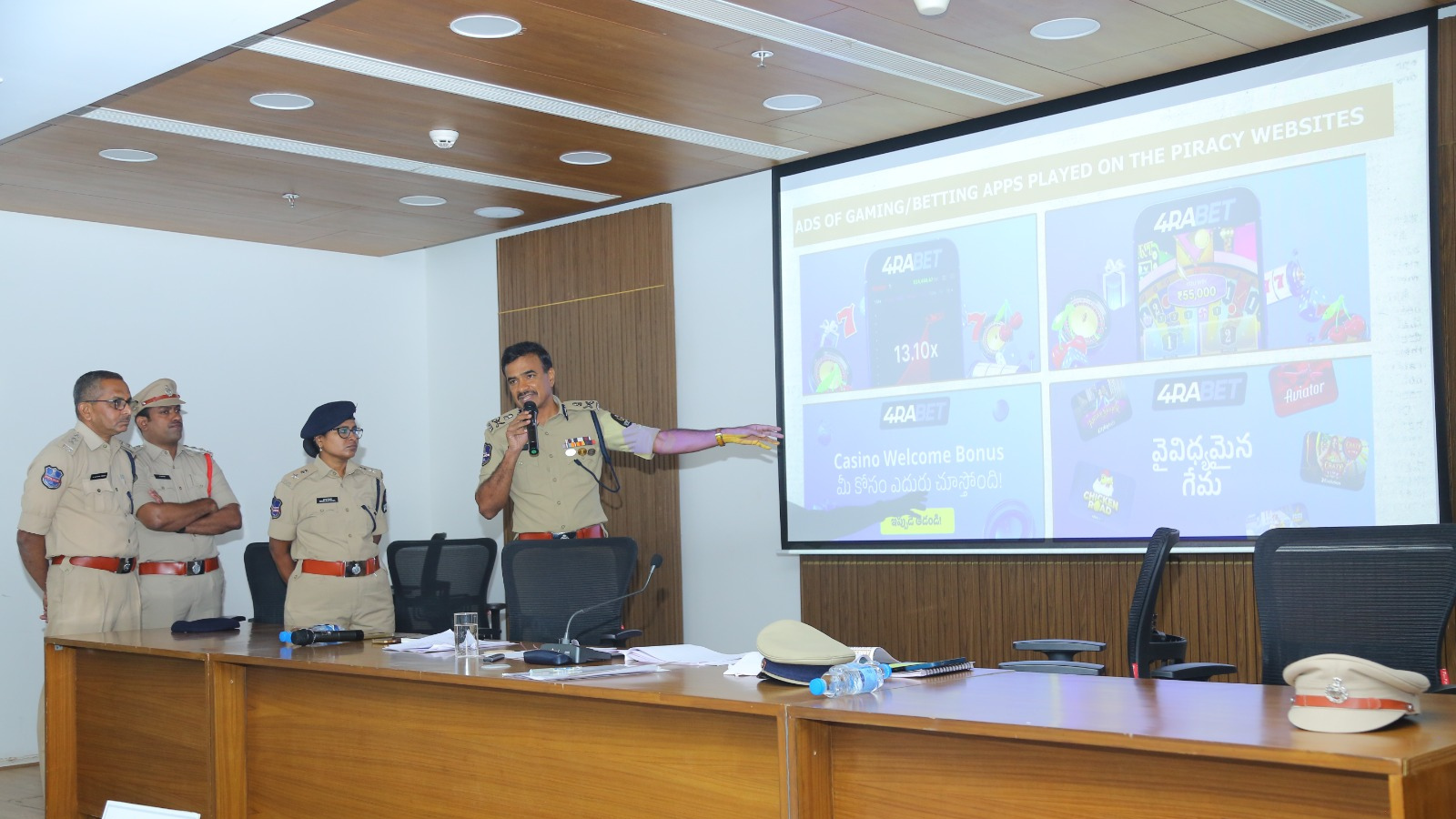By Saicharan Sana,Saicharan Sanapublish
Copyright thesouthfirst

The Piracy Empire: How a 21-year-old from Bihar brought Tollywood to its knees
The five accused now face up to three years imprisonment and fines of ₹2 lakhs under the Copyright Act and Cinematograph Amendment Act, 2023.
Synopsis: While most 21-year-olds were worrying about college exams or job interviews, Ashwani Kumar was breaking into the impenetrable digital fortresses of media companies. His target? The main servers where pristine HD copies of unreleased films sat, worth hundreds of crores.
He was just 21 years old, living in a modest house in Sampathchak, Bihar. But Ashwani Kumar had a skill that would make him the most wanted man in the Indian film industry—he could hack into the digital vaults of movie studios and steal high-definition films before they even reached theatres. And he was costing Tollywood producers crores in losses with every keystroke.
When the lights dimmed in theatres across Hyderabad on 1 May 2025, for the premiere of HIT: The Third Case, producers held their breath, hoping for a blockbuster opening.
But within hours, their worst nightmare materialised—crystal-clear HD copies were already spreading like wildfire across 1TamilBlasters, 5MoviezRulz, and 1TamilMV. The same fate befell #Single on 9 May, and Kubera soon after. The box office dreams were dying before they could even take flight.
“Piracy significantly impacts the Indian film industry, causing substantial financial losses and hindering its growth. In 2023, the Indian entertainment industry suffered an estimated ₹22,400 Crore loss due to piracy. This includes losses due to pirated content from both the movie theatres and the OTT platforms,” said CV Anand, Hyderabad City Police Commissioner, whose cyber crime team would eventually crack open this sophisticated criminal empire.
The Digital heist artist
While most 21-year-olds were worrying about college exams or job interviews, Ashwani Kumar was breaking into the impenetrable digital fortresses of media companies. His target? The main servers where pristine HD copies of unreleased films sat, worth hundreds of crores.
“Ashwani Kumar (A-1) is the prime accused and kingpin behind the leakage of HD movies before they are even released into the theatres. He hacked the main servers of digital media companies, copied the HD movies and sent them to other Telegram users,” Commissioner Anand revealed, describing how the young man from Bihar became the nightmare of every film producer.
Kumar’s operation was breathtakingly simple yet devastatingly effective. He would infiltrate Telegram piracy groups with ominous names—HDmovies, Flimyzap, World4free—and make his pitch to the shadowy administrators: pristine HD movies for $800 a piece, payable only in Bitcoin.
His contact, known mysteriously as “Noble,” would provide the cryptocurrency wallet addresses. Gaming and betting organisations, hungry for content to bait their victims, would transfer the money. The films would flood piracy websites within hours.
Also Read: Telangana SEC likely to issue notification for local body polls
The Mastermind with Paris Servers
But Kumar was just the supplier. The real architect of this digital empire was sitting 2,000 kilometres away in Karur, Tamil Nadu—32-year-old Cyril Infant Raj Amaladoss, a crypto trader who understood that in the digital underworld, geography meant nothing.
“Cyril Infant Raj Amaladoss (A-2) is the mastermind who has engaged the other accused for cam-cording the movies in theatres and uploading the pirated content on the piracy websites,” Anand explained.
Amaladoss had built his kingdom on virtual machines. He purchased two dedicated servers located in Paris—because operating from France meant less scrutiny, more anonymity. From these digital fortresses, he controlled the notorious 1TamilBlasters website, its multiple extensions, Gmail accounts, Proton mail accounts, Telegram channels, Cloudflare, and Cloudvastra servers. It was a sophisticated operation masked behind layers of encryption and international servers.
“The Accused Cyril Raj purchased two dedicated Virtual Machine Servers (with Paris Location) from one dedicated server hosting company to store all Pirated Movies, to operate the 1TamilBlaster website, Telegram application, Gmail accounts, Proton mail accounts and other operations related to the website operation besides using the VMware,” Commissioner Anand detailed.
Into the web of online betting
He further added, “HD movies have been shared from the studio copies by hacking the main servers of the digital media companies. Their main servers were hacked and accessed by the accused Ashwani Kumar, and the HD Movies were shared by him with gaming, betting organisers through Telegram channels,”
But Amaladoss wasn’t just stealing content—he was monetising misery. Online betting platforms like 1xBet, 4raBet, Rajbet, and Parimatch knew that people who came looking for “free” movies were perfect targets for gambling addiction. They paid Amaladoss handsomely for advertising space.
“He has received remuneration of $10,000 per month in cryptocurrency by allowing the promotional content and advertisements of the online betting and gaming sites, he has uploaded about 500 pirated movies since 2020 and earned about ₹2 Crores in cryptocurrency. He has demanded the owners of the betting/gaming Apps such as 1xBet, 4raBet, Rajbet, and Parimatch for increasing the monthly remuneration to $30,000,” the Commissioner disclosed.
Also Read: Telangana enacts 42 percent BC quota in local body polls with GO
The Theatre Ghosts
While Kumar and Amaladoss handled the high-tech end, a network of operatives worked the old-fashioned way—inside darkened movie halls with concealed cameras.
Twenty-nine-year-old Jana Kiran Kumar, an AC technician from Vanastalipuram, had perfected the art of invisible recording. His weapon of choice? An iPhone 14 Plus was tucked into his shirt pocket. He’d book tickets on BookMyShow, walk into Hyderabad’s multiplexes, and capture entire films while munching popcorn.
One hundred movies. One hundred times, he walked in and walked out, undetected, with digital gold in his pocket. For #Single, he chose Cinepolis at Mantra Mall, Attapur—the irony wasn’t lost on investigators when they traced the leak back to him.
His payment? Between $300 and $400 per movie in Bitcoin, converted to rupees through crypto trading platforms. Not bad for a night at the movies.
Operating from Tamil Nadu
Thirty-one-year-old Sudhakaran from Tamil Nadu had his own origin story. He joined a Telegram group that read like a criminal academy—complete instructions on how to record films illegally in theatres. His first assignment was Naai Sekar at SRK Theatre in Coimbatore.
He uploaded it through WeTransfer, dropped the link in 1TamilMV’s chat box, and watched cryptocurrency flow into his Blockchain.com wallet.
By the time police caught him, he’d recorded 35 films—Tamil blockbusters like ARM and Vezham, Telugu hits like Radhe Shyam, Dasara, and Lucky Baskhar.
“He has coordinated with the other piracy operators and paid agents up to $150 per movie for in-theatre recording of movies in multiple languages,” Commissioner Anand said, describing how Amaladoss had built an army of theatre recorders across South India.
The logistics expert
Twenty-three-year-old Arsalan Ahmed, a student from Goa, was the logistics expert.
He and his associates, Asghar and Ranveer, would record films, upload massive files to SendGB.com, generate unique download links, and shoot them via Telegram to Amaladoss (whose handle was the innocuous “Andy JS”).
For each film, Ahmed received $135 USD transferred to his Binance wallet. Even students had found a way to monetise movie theft.
Also Read: Tamil Rockers member arrested for filming Dhanush’s ‘Raayan’ in a theatre
The Unravelling
The empire began crumbling when Yarra Manindra Babu from the Anti-Video Piracy Cell of the Telugu Film Chamber of Commerce filed a complaint on 5 June, 2025. Forensic watermarking on the pirated copies pointed to theatre leakage. The cybercrime team went to work.
Commissioner Anand announced, “The Cyber Crime Police of Hyderabad has successfully dismantled the major movie piracy racket by arresting five key individuals involved in the illegal distribution of copyrighted films and issuing notices to 5 individuals for aiding and abetting the fraud.”
“These arrests are the result of a comprehensive investigation into the piracy of several new Telugu films, including HIT: The Third Case, #Single, Kuberaa and Hari Hara Veera Mallu, which have been uploaded onto the illegal websites: 1TamilBlasters, 5MoviezRulz, and 1TamilMV, ” he added.
The accused had used every trick in the cybercrime handbook—multiple Telegram IDs, cryptocurrency payments, virtual machines, encrypted communications, international servers. They communicated exclusively through anonymous Telegram handles, paid only in Bitcoin converted through middlemen into USDT ( USDT, is a cryptocurrency stablecoin launched by Tether) and then rupees. They thought they were invisible.
But the Indian Cybercrime Coordination Centre’s Samanvaya portal helped investigators track the labyrinthine cryptocurrency trails. One by one, they fell: Jana Kiran Kumar on 30 June, Cyril Amaladoss on 28 July, Ashwani Kumar on 11 August, Sudhakaran on 13 August, and Arsalan Ahmed on 11 August.
“The IO seized several electronic items such as the CPU, a tablet, Hard disks, mobile phones, laptops, dongles, pen drives, web cam, memory cards and processors which were being used by the arrested accused in the commission of the offence,” Commissioner Anand confirmed.
The seized devices told stories of their own—servers full of stolen films, cryptocurrency wallets fat with illegal earnings, Telegram conversations plotting the next heist.
The Real Cost
The misconception that pirated content is free is perhaps the most dangerous lie the internet tells. Those websites offering “free” movies? They’re traps baited with stolen content, designed to harvest personal data, spread malware, and funnel victims toward online gambling and financial scams.
For producers who spend years and crores creating films, hiring hundreds of daily wage workers, junior artists, and technicians, piracy isn’t just theft—it’s a knife to the throat of the entire industry. When HIT: The Third Case or Kubera appeared on 1TamilBlasters on release day, it wasn’t just lost revenue. It was crushed dreams, unpaid wages, and shuttered production houses.
The five accused now face up to three years imprisonment and fines of ₹2 lakhs under the Copyright Act and Cinematograph Amendment Act, 2023.
But the real question remains: How many more Ashwani Kumars are out there, sitting in small towns with big ambitions and dangerous skills, one hack away from bringing down another film?
Also Read: Pirated version of ‘Ajayante Randam Moshanam’ out, makers seek probe
(Edited by Sumavarsha)



